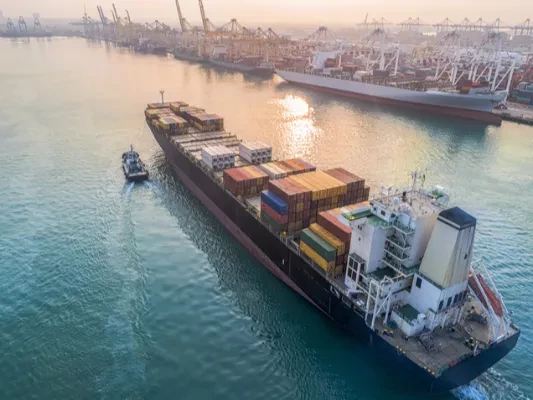Red Sea crisis reaches peak impact on box ships

Almost all of the services from the top 10 container lines have diverted via the Cape of Good Hope and escalation of Houthi attacks would have little impact according analyst Linerlytica.
Of the leading container ship operators only CMA CGM has continued to transit Suez, with an 11-ship service, of between 9,000 and 11,000 teu, all of which are operated by CMA CGM with its Ocean Alliance partners, COSCO, OOCL and Evergreen taking slots on the service.
“Any further escalation of the Red Sea crisis would have a limited impact on the container markets as only 14% of the ships currently deployed on the Asia- Europe trade are using the Suez Canal,” said Linerlytica.
Breaking that down the analyst that in terms of the overall capacity these vessels comprise only 4% of the total 7.48 million teu deployed on these services.
According to Linerlytica only 72 of the 513 ships currently operating on Asia-Europe trades are still using the Suez Canal, and they are mainly smaller operators based in China, Russia, Singapore, Turkey and UAE.
The analyst said that increased tensions in the region, after Yemen attacked Tel Aviv with drones and Israel’s retaliation at Hodeidah, has not altered containership movements in the Red Sea region.
All of the main carriers on the Asia-Europe trade have diverted their ships to the Cape route, with CMA CGM being the sole exception as it continues to operate 11 ships on its Asia-Med Phoenician Express (BEX2) service via the Suez/Red Sea route.
The Phoenician Express (BEX2) service calls at ports in China, South Korea Singapore, Malaysia and transits the Suez Canal to call at Adriatic ports in Italy, Slovenia and Croatia as well as Lebanon, Egypt and the UAE.
The decline in container vessels transiting Suez, along with the ships from all the major sectors, bulk, tankers and gas carriers has had a major impact on the Suez Canal Authority (SCA)’s revenue.
Last week the SCA reported a $2.2 billion fall in revenue for the financial year ending in April 2024, compared with the $9.4 billion revenues in the previous year.
The number of ships transiting the canal in the 2023/2024 year fell to 20,148, from 25,911 the year before, according to SCA head Osama Rabie.
The Suez Canal is a key source of foreign currency for Egypt, and authorities have been trying to boost its revenues in recent years, including via an expansion in 2015, reported Reuters.
However, that income is unlikely to be revived in the near future as the conflict in Gaza is in danger of spreading into the Lebanon and Yemen as regional groups, supporting the Palestinian cause, are becoming increasingly active.
Read more: https://www.seatrade-maritime.com/containers/red-sea-crisis-reaches-peak-impact-box-ships
News courtesy of Seatrade Maritime News.



